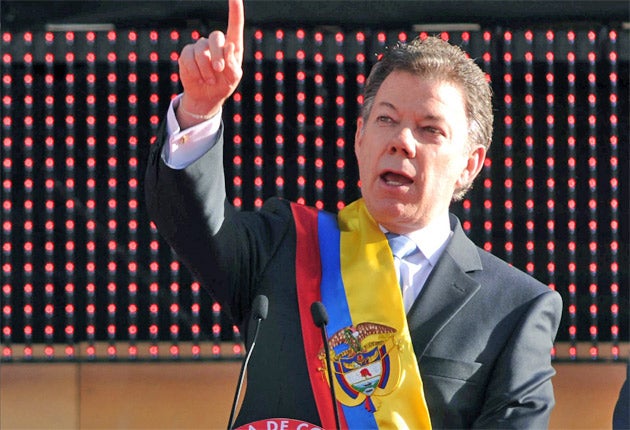Chavez summit eases tensions with Colombia

Your support helps us to tell the story
From reproductive rights to climate change to Big Tech, The Independent is on the ground when the story is developing. Whether it's investigating the financials of Elon Musk's pro-Trump PAC or producing our latest documentary, 'The A Word', which shines a light on the American women fighting for reproductive rights, we know how important it is to parse out the facts from the messaging.
At such a critical moment in US history, we need reporters on the ground. Your donation allows us to keep sending journalists to speak to both sides of the story.
The Independent is trusted by Americans across the entire political spectrum. And unlike many other quality news outlets, we choose not to lock Americans out of our reporting and analysis with paywalls. We believe quality journalism should be available to everyone, paid for by those who can afford it.
Your support makes all the difference.Frictions between Venezuela and neighbouring Colombia, which have recently stirred fears of a military clash, were easing last night as their leaders – Hugo Chavez and Juan Manuel Santos – met for a private and hastily arranged summit in the Colombian city of Santa Marta on the Caribbean coast.
The meeting was set up only days after the weekend inauguration of President Santos, a former defence minister. The haste reflected a desire on both sides to overcome a series of diplomatic spats that has virtually halted once-burgeoning trade between them. "We are here seeking the re-establishment of relations between two sister countries," Mr Santos said just before the talks.
Mr Chavez adopted a similarly optimistic tone. "We shall begin patiently to rebuild what was torn apart," he told reporters. "We have enough resources to build new and good relations between Colombia and Venezuela. After all these vicissitudes, despite all these storms, Colombia, I have come to ratify my love. My love will be eternal, the love of a son, a Bolivarian, a soldier of this country."
Mr Chavez, the self-described leader of a socialist revolution in Venezuela, cut off relations with Colombia last month after Mr Santos's predecessor, Alvaro Uribe, accused him of harbouring as many as 1,500 Marxist guerrillas on his territory. The allegation had been made before, but Mr Chavez has repeatedly dismissed it.
Relations between Bogota and Caracas have been especially strained since 2008 when Mr Santos, as defence minister, ordered a military raid on a Marxist rebel camp just inside Ecuador that ended with the killing of the second-in-command of the Revolutionary Armed Forces of Colombia, known as Farc. Both Ecuador and Venezuela responded by sending troops to their frontiers while warning openly of war.
The arguments have flared again recently both in respect to guerrilla encampments and an agreement signed by Colombia with the United States giving the American military greater access to its bases to help in the fight against drugs trading and the threat from the rebels. The Venezuelan government claimed Colombia was seeking to undermine it with assistance from the US. While in the past Mr Chavez has branded Mr Santos a "warmonger", it may now be in his interests to calm the waters.
He faces difficult legislative elections in the autumn in a difficult economy marked by sharply rising prices. An end to the dispute with Colombia would allow Venezuela to resume cheap food imports.
Santa Marta, a steamy and dank port city that sits beneath the snowy peaks of the Colombian Sierras, served until recently as an operating base for the Farc. The presidents met privately at a colonial-era estate where the 19th-century independence hero Simon Bolivar, who fought to free South America from Spanish rule, drew his last breath. It was a poignant venue for Mr Chavez, who has repeatedly said that Bolivar was the inspiration for his Venezuelan "revolution".
Mr Santos, meanwhile, has signalled a pragmatic approach towards healing wounds with Colombia's neighbours. "I prefer frank and direct dialogue," he said at his inauguration on Saturday. As soon as the swearing-in was concluded in Bogota, Mr Chavez announced he would like a quick face-to-face meeting with the new president.
In a further gesture designed to lubricate last night's summit, Mr Chavez issued an appeal to the Farc and to another affiliated Marxist military group, the National Liberation Army, to release all hostages.
Observers said that the change of tone in Colombia's presidential palace is likely to prove crucial because the distrust between Mr Chavez and Mr Uribe had become deeply personal. Since winning elections in June, Mr Santos has been delicately distancing himself from some of the policies of his predecessor.
However, others warned that the differences were too great to be settled all at once. "Deeper differences between the two governments, including over ideology and attitudes to the United States, will not simply disappear," said Christian Voelkel, an analyst with IHS Global Insights risk consultants.
Until the recent freeze in relations, Venezuela was Colombia's biggest trade partner with the exception of the United States. Restoring bilateral trade between the countries that could be worth more than $7bn (£4.4bn) a year could be a powerful impetus for economic recovery for both of them.
Join our commenting forum
Join thought-provoking conversations, follow other Independent readers and see their replies
Comments